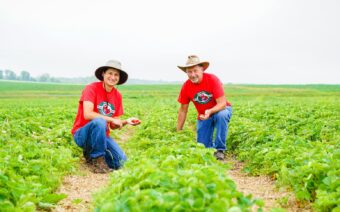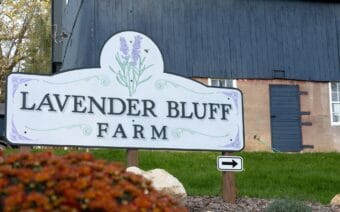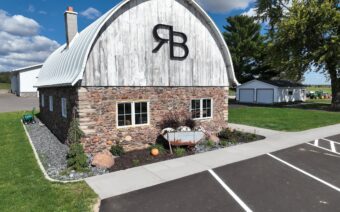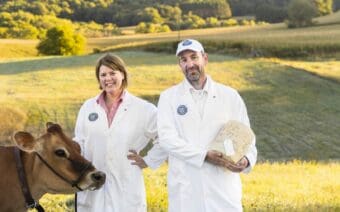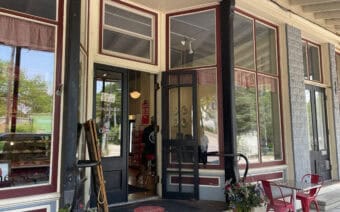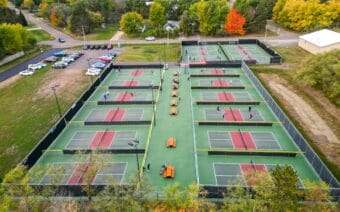
June 24, 2024
CHIPPEWA FALLS – One hundred and twenty years ago, Max Klinger said his family moved to Wisconsin and cleared several acres of forest to build a small dairy farm.
Today, on that same land, Klinger’s great, great grandson, Troy Amelse, runs one of the largest retail greenhouse businesses in the state – which is comprised of 22 greenhouses and 100 acres of produce gardens.
“We have people who come here from all over – Chicago, the cities or Duluth – who specifically come here to buy (from us),” Amelse said. “We take a lot of pride in growing this stuff and trying to provide the healthiest plants and sell them at a fair price.”
According to the U.S. Department of Agriculture’s 2022 Census of Agriculture, Wisconsin lost 533,952 acres of farmland between 2017 and 2022 – with much of this loss being smaller farms.
Amelse said the reason Klinger Farm Market has survived and thrived over the years is due to the family’s willingness to be versatile in its agriculture and adaptive to its customers’ needs.
“I think that’s one thing we’ve done well,” he said. “Recognizing opportunity and pivoting on that and taking advantage of market opportunity. Plus, we work hard and are honest people… We never try to take advantage of people.”
An ever-changing operation
For its first 20 years, Amelse said the Klinger farm operated as a dairy.
In the 1920s and 1930s, he said the farm began raising foxes to use for coats and pelts, much of which was shipped to Europe to support its fashion industry.
Foxes, Amelse said, were replaced by mink in the late 1940s and early 1950s – which continued until 1996.
“I was about five or six years old,” he said. “I remember reaching my hands through the cages to pet them and getting nipped.”
In addition to animals, Amelse said the farm grew cash crops.
Beginning in the 1960s, after his grandfather Dennis Klinger brought home potatoes as a part of a Future Farmers of America project, he said the farm began to grow and sell more garden vegetables.
Eventually, Amelse said his great uncles, David and Robert, decided to build a greenhouse to start transplants for the garden.
“People started coming in and said, ‘hey, let me buy some of these tomatoes,’” he said. “Eventually, it snowballed out of growing some vegetables… to growing bedding plants and flowers.”
In the 1980s, Amelse said his mother, Mary Klinger-Amelse, became a business partner with her uncles.
Because his great uncles grew up during the Great Depression, Amelse said they tended to focus on saving money and focusing on year-to-year business plans, rather than long-term investments.

His mom, however, he said, encouraged his family to build its first large greenhouse.
“She’s the one who expanded the greenhouses and took the business in the direction it went,” he said.
The fifth generation takes charge
Amelse said he began working for Klinger Farm Market in 2013 after serving in the Marines – while also attending the University of Wisconsin-Eau Claire for a business degree.
Between 2016-18, he said he began to take on some of the farm’s operations.
Today, Amelse is president of the company.
“My mom is still here, and she’s the heart and soul of the place,” he said. “I have kept taking the business in her direction.”
Amelse said his business philosophy centers around maintaining the farm’s healthy reputation.
“I try to provide only the best stuff – I plant the best varieties and I don’t cut corners,” he said.
Amelse said 95% of the million plants Klinger Farm Market sells are grown in-house, seed-by-seed.
Three-quarters of the farm’s sales, he said, take place between April and June, with Mother’s Day bringing in 10-15% of the farm’s yearly revenue.
Today, almost all plants and produce, Amelse said, are sold in-house.
“The scale of that going out these doors is unreal,” he said. “We sell our plants 50% cheaper than most people, which I know is probably frustrating for my competitors.”
Klinger Farm Market’s staff, Amelse said, consists of about 20 full-time and 50 seasonal employees – most of which return to the farm each spring.
Kathy Bowe has worked for Klinger Farm Market the longest of anyone outside of the family, celebrating her 29th anniversary this year.
“I’ve shopped here forever,” Bowe said. “Mary (Klinger-Amelse) said you can come and work for me if you quit your job, so I’ve been here ever since.”
Bowe said Klinger Farm Market continues to be successful because it respects its customers.
“We’re good at what we do, and people like it,” she said. “My sisters live in the Twin Cities and come here and say, ‘oh my gosh, it’s so much cheaper here.’ Plus, we have a nice variety of stuff.”
Amelse said one of his main focuses for the business is giving back to the community.
“We’ve always been a morally conscious company,” he said.
Amelse said profits are used to take care of his employees and support community development.
“I’ve increased my wages more than I’ve increased my profitability,” he said. “Anything I invest money in is to make the lives easier of the employees and customers I have.”
One way Amelse said he invests in his customers is by providing affordable, family-friendly activities throughout the year.
In the fall, while the farm sells pumpkins and the last of its sweet corn, he said Klinger Farm Market opens a corn maze and play area – complete with a jumping pillow and corn pit – free of charge.
In the next couple of years, Amelse said he plans to install a new jungle gym.
He said the farm also hosts class trips throughout the school year.
Changing seasons = changing products
As the seasons change, Amelse said, so do Klinger Farm Market’s products.
Each spring, he said the store is filled with bulk and prepackaged seeds, seed potatoes and just about everything else to start a garden.
With more than two dozen greenhouses, Amelse said Klinger also has a large selection of annual and perennial plants.

Summer brings with it fresh, hand-picked, homegrown produce – including multiple varieties of potatoes, peas, beans, tomatoes, peppers and sweet corn – all homegrown in Klinger’s 50-acre garden.
In the fall, Amelse said, Klinger Farm Market’s five-acre corn maze and family fun area are in full swing.
The farm also has an array of garden mums, gourds, pumpkins, colored corn and broomcorn available for purchase.
Multiple varieties of birdseed and bird feeders, Amelse said, are available during the winter season.
Christmas greenery, trees, holiday decorations and hand-decorated wreaths, he said, are also available that time of year.
Looking forward
After construction on his newest greenhouse is finished, Amelse said he hopes to focus his efforts on a solar project – which aims to improve the farm’s sustainability.
“The reality is, anything in agriculture is not super energy efficient,” he said. “But if this solar facility gets finished, it will provide about 85% of the power.”
Amelse said one of his goals is to decrease the farm’s power usage, which – with the help of the solar facility – would result in a net positive or the creation of energy.
He said this project will take some time, due to the red tape involved with dealing with the federal and state government and energy companies.
With the family’s next generation – Amelse’s three kids – still in elementary and middle school, he said it’s too early to tell who will eventually lead the farm.
“My youngest two have started working this spring,” he said. “They’re surprisingly good at the cash registers. I think they’re most interested in the farm.”
In the meantime, Amelse said he plans to continue evolving the farm to meet the needs of the community, just as the generations before him have done.
Klinger Farm Market – located at 12756 132nd St. in Chippewa Falls – is open 9 a.m. to 6 p.m. daily.
For more information, visit klingerfarmmarket.com.
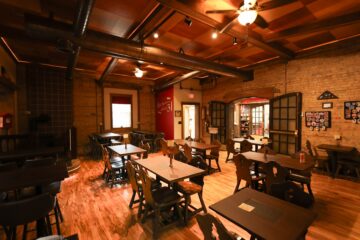 Old Station 31 Spirits – defined by family, tradition, service
Old Station 31 Spirits – defined by family, tradition, service Ashwaubenon Bowling Alley installs Neoverse LED video wall
Ashwaubenon Bowling Alley installs Neoverse LED video wall


